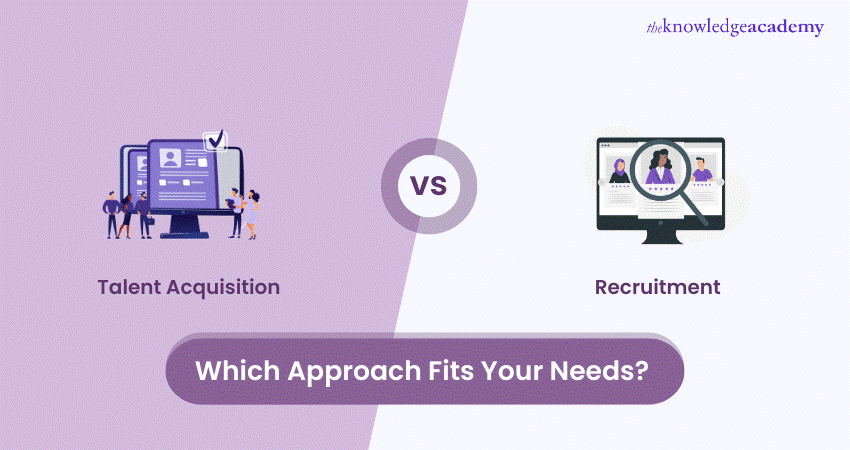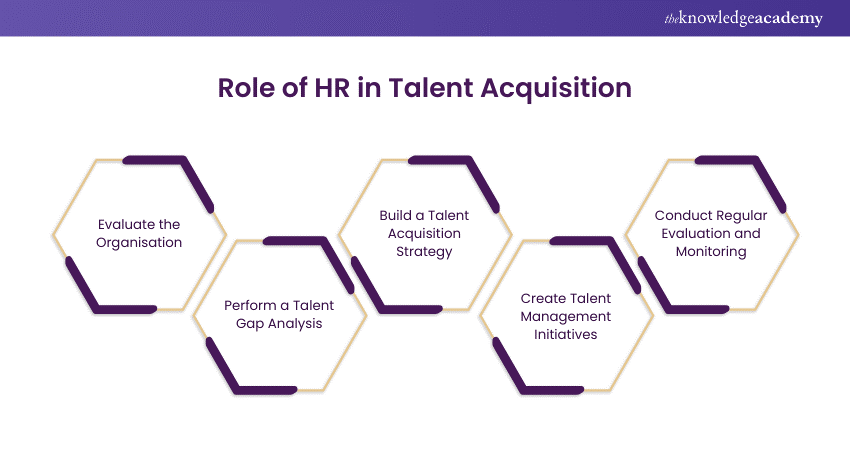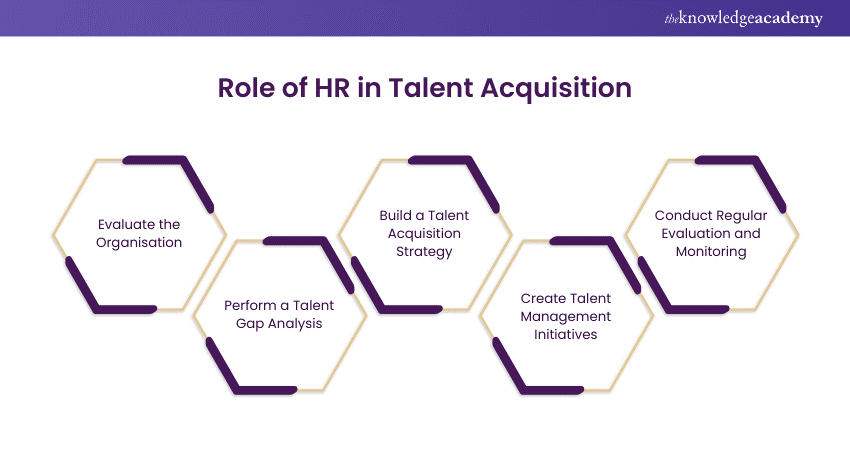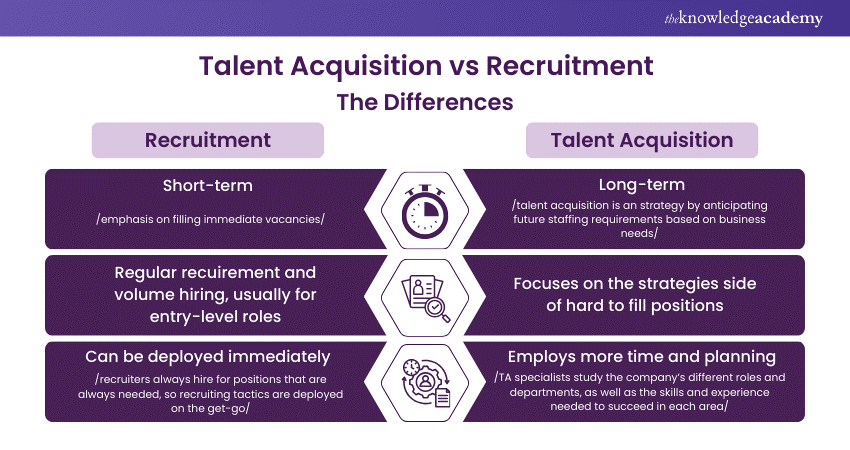We may not have the course you’re looking for. If you enquire or give us a call on +44 1344 203 999 and speak to our training experts, we may still be able to help with your training requirements.
Training Outcomes Within Your Budget!
We ensure quality, budget-alignment, and timely delivery by our expert instructors.

Are you struggling to understand the difference between Talent Acquisition vs Recruitment? These two processes are key to building a strong and efficient team. However, they take different approaches and have distinct long-term impacts.
Recruitment focuses on filling immediate job vacancies. At the same time, Talent Acquisition is a strategic approach to sourcing and developing talent for future needs. Choosing the right method can significantly influence the success of your organisation.
Read this blog to discover the differences between Talent Acquisition vs Recruitment. Learn how to optimise your hiring strategy for both immediate and long-term success. Strengthen your HR efforts today!
Table of Contents
1) What is Talent Acquisition?
2) What is Recruitment?
3) Key Differences Between Talent Acquisition and Recruitment
a) Investment
b) Brand Image and Reputation
c) Company Growth
d) Proactive vs. Reactive Approaches
e) Sourcing Strategies
f) Core Focus
g) Daily Responsibilities
h) Candidate Relationships
4) How to Choose the Right Approach for Your Business
5) Conclusion
What is Talent Acquisition?
Talent Acquisition is a long-term strategy. It is focused on attracting specialised talent to meet a company’s strategic goals. It involves proactive efforts like networking at industry events and using social media to build relationships with potential candidates. Key strategies of Talent Acquisition include:
1) Building a strong company identity
2) Using data-driven marketing
3) Partnering with universities
4) Offering incentives and flexible work options
5) Designing competitive benefits
6) Aligning with business goals
The Role of HR in Talent Acquisition
To maximise your Talent Acquisition efforts, HR can follow these steps:

1) Evaluate the Organisation: Consult with management to understand overall objectives and departmental needs. For example, if the company is undergoing mergers or launching new business lines, identify the additional talent required.
2) Perform a Talent Gap Analysis: Assess the responsibilities and competencies of your current employees. Identify what skills are missing in them by reviewing performance evaluations and exit interviews. This helps identify what is needed to achieve business goals.
3) Build a Talent Acquisition Strategy: Develop a strategy based on required skills and ideal candidate profiles. This may include rewriting job descriptions, Recruitment marketing, employer brand campaigns, and employee referral programmes.
4) Create Talent Management Initiatives: Implement various programmes to help new hires develop the necessary skills. This can include training, mentoring, coaching, and other learning and development activities.
5) Conduct Regular Evaluation and Monitoring: Continuously monitor and evaluate how effective is your strategies. Track Recruitment marketing and employer branding performance to see if there’s an improvement in candidate quality and employee satisfaction.
What is Recruitment?
Recruitment focuses on filling current vacancies through a short-term, linear process. It often depends on passive sourcing methods like ATS, job boards, and company websites. Recruitment is applicable to any job role and industry.
Typically, the process begins when a position becomes vacant. HR or management posts a job description online and conducts interviews to quickly fill the role. This standardised process is common during periods of expansion or high turnover.
Common Recruitment methods include:
1) Posting positions on career sites and job boards
2) Attending networking events
3) Using Social Media Marketing for sourcing
4) Encouraging employee and industry referrals
5) Promoting or transferring internally
6) Conducting video interviews before in-person interviews
7) This approach ensures quick and efficient hiring to meet immediate needs
The Role of HR in Recruitment
HR plays a crucial role in the hiring process. Here are some key responsibilities:

1) Analyse Job Specifications: Assess job requirements based on the role within the organisation.
2) Writing Job Descriptions and Posting: Develop job descriptions that accurately reflect the necessary skills and daily tasks and publish them on various platforms and job boards.
3) Screening and Background Checking: Review resumes to identify suitable candidates, conduct initial phone screenings, and perform reference checks to verify qualifications and work experience.
4) Conducting Interviews: Ask questions to determine the candidate’s fit for the position, often collaborating with Hiring Managers during the interview process.
5) Managing Job Offers and Salary Negotiations: Extend job offers to the selected candidates. This ensures that the compensation and benefits are competitive and appropriate based on qualifications and market Data.
6) Onboarding: Welcome new hires and ensure they are prepared for success in their roles.
This approach ensures that the right candidates are selected and smoothly integrated into the organisation.
Learn to inspire, motivate, and lead diverse teams successfully with our in-depth People Management Courses – Register today!
Key Differences Between Talent Acquisition and Recruitment
There are many differences between recruiting and Talent Acquisition. They help companies choose which hiring strategy to implement. Here are the major differences between recruiting vs Talent Acquisition:

Investment
Recruitment aims to fill vacant positions with minimal investment, using methods like job ads or storefront signs. Specialised fields may require more investment to find skilled candidates. Once positions are filled, no further expenses are needed.
Talent Acquisition, however, requires ongoing investment. They use resources to attract qualified candidates continuously. For example, a company might install a cafeteria to offer free meals as part of their Talent Acquisition strategy.
Brand Image and Reputation
Recruitment usually has a limited impact on a company’s brand image and reputation. While a positive candidate experience can lead to advocacy, it doesn’t usually drive other professionals to seek employment with the company. Recruitment is often a short-term activity that lacks long-term reputation benefits.
At the same time, Talent Acquisition actively enhances a company’s reputation among potential candidates. This can include adjusting workplace culture, adopting brand values, or implementing PR campaigns to raise awareness. When professionals understand the benefits of working at a company, they are more likely to pursue job opportunities there.
Company Growth
Recruiting aligns with company growth, bringing in staff as the business expands and revenue increases. While it supports growth, recruiting mainly focuses on maintaining operations rather than driving growth. Occasionally, a great hire can boost revenue, but this is not its primary aim.
Talent Acquisition, on the other hand, is a strategic approach designed to facilitate growth. It attracts innovators, creatives, and leaders who can develop the company and promote growth. These high-profile employees can transform company functions, streamline operations, and devise optimal business strategies.
Proactive vs. Reactive Approaches
Recruiting is a responsive process that happens when a company needs new staff, either due to employee turnover or expansion. A company with a stable team and no growth plans doesn’t require Recruitment.
Talent Acquisition, however, is proactive, attracting qualified candidates even without open positions. This approach ensures that when openings arise, candidates are already familiar with the company. For example, interested candidates might use alerts to stay informed about new job opportunities.
Sourcing Strategies
Recruiters job focus on filling immediate vacancies using direct methods like job boards, resume sifting, and using networks. Their approach is reactive, addressing current needs.
Talent Acquisition specialists build a talent pipeline for future needs using diverse methods like employer branding, industry events, and social media. Their approach is proactive, anticipating future talent requirements.
Core Focus
Recruitment focuses on swiftly identifying the right candidates to address immediate staffing needs. In contrast, Talent Acquisition is a long-term, ongoing strategy aimed at building a talent pipeline that aligns with a company’s culture and objectives, even when there are no current job vacancies.
Daily Responsibilities
Recruitment focuses on quickly filling immediate job vacancies through activities like posting job openings, reviewing resumes, and conducting interviews. It’s more transactional and short-term.
Talent Acquisition, on the other hand, is a strategic, long-term process. It involves building a talent pipeline, enhancing employer branding, and focusing on employee retention and development. It’s about finding the right fit for the future, not just for today.
Candidate Relationships
The way relationships are built with potential candidates also sets Recruitment and Talent Acquisition apart. Recruitment often feels transactional, with recruiters connecting with candidates to fill specific roles. Once the position is filled and the candidate is onboarded, the relationship typically ends.
At the same time, Talent Acquisition focuses on long-term relationship building. Talent Acquisition specialists aim to forge lasting connections with top talent, even when there are no immediate job vacancies. The goal is to create a strong talent pipeline, allowing candidates to reach out when the right opportunity arises.
Enhance your team performance and productivity with our Successful People Management and Team Leadership Course – Sign up today!
How to Choose the Right Approach for Your Business
To determine whether Recruitment or Talent Acquisition is better for your business, consider the following factors:
1) Hiring Needs
a) Talent Acquisition: Ideal for companies with frequent openings and growth, focusing on long-term strategies to attract and retain top talent and build a strong employer brand.
b) Recruitment: Suitable for immediate or short-term hiring needs, where experienced recruiters or agencies can quickly fill positions.
2) Role Complexity
a) Talent Acquisition: Beneficial for roles requiring specialised skills or qualifications, leveraging a strategic approach.
b) Recruitment: Effective for more general roles, utilising a recruiter’s broad network.
3) HR Team Capabilities
a) Talent Acquisition: If your HR team excels in daily tasks but lacks strategic foresight, focus on long-term planning, employer branding, and building a talent pipeline.
b) Recruitment: If your HR team is strategic but struggles with immediate hiring demands, prioritise Recruitment.
4) Industry Knowledge
a) Talent Acquisition: Necessary if your team lacks industry-specific knowledge or struggles to attract specialised candidates.
b) Recruitment: Less critical if your team already understands the industry and roles well.
5) Time and Resources
a) Talent Acquisition: Requires more resources, long-term planning, and implementation time.
b) Recruitment: Delivers immediate results with fewer resources.
6) Company Culture
a) Talent Acquisition: Best if building an employer brand and attracting top talent is a priority.
b) Recruitment: More appropriate for quickly filling immediate vacancies.
By considering these factors, you can choose the approach that best aligns with your business needs and goals.
Conclusion
Talent Acquisition vs Recruitment has different roles in an organisation’s hiring strategy. Recruitment focuses on filling immediate vacancies with suitable candidates. In contrast, Talent Acquisition aims to build a pipeline of skilled individuals for future needs. This is to ensure long-term organisational growth and success. Both processes are essential for the growth of the company.
Develop advanced skills in sourcing, evaluating, and hiring talent to meet your company’s needs with our Talent Acquisition Training – Join now!
Frequently Asked Questions

A Talent Acquisition Manager focuses on long-term Recruitment strategies and building talent pipelines, while a Hiring Manager is responsible for filling specific job vacancies and managing the interview and selection process for their team or department.

Job analysis and planning: Identifying the need and defining the role.
1) Sourcing: Finding potential candidates.
2) Screening: Reviewing applications and shortlisting candidates.
3) Interviewing: Conducting interviews to assess fit.
4) Selection and Onboarding: Choosing the best candidate and integrating them into the organisation.

The Knowledge Academy takes global learning to new heights, offering over 30,000 online courses across 490+ locations in 220 countries. This expansive reach ensures accessibility and convenience for learners worldwide.
Alongside our diverse Online Course Catalogue, encompassing 19 major categories, we go the extra mile by providing a plethora of free educational Online Resources like News updates, Blogs, videos, webinars, and interview questions. Tailoring learning experiences further, professionals can maximise value with customisable Course Bundles of TKA.

The Knowledge Academy’s Knowledge Pass, a prepaid voucher, adds another layer of flexibility, allowing course bookings over a 12-month period. Join us on a journey where education knows no bounds.

The Knowledge Academy offers various People Management Courses, including Talent Acquisition Training, Talent Management Training and Successful People Management and Team Leadership Training. These courses cater to different skill levels, providing comprehensive insights into Talent Management.
Our HR Resources Blogs cover a range of topics related to Talent Acquisition, offering valuable resources, best practices, and industry insights. Whether you are a beginner or looking to advance your HR Management skills, The Knowledge Academy's diverse courses and informative blogs have you covered.
Upcoming HR Resources – Learn about Human Resources Batches & Dates
Date
 Talent Acquisition Training
Talent Acquisition Training
Fri 14th Feb 2025
Fri 11th Apr 2025
Fri 13th Jun 2025
Fri 15th Aug 2025
Fri 10th Oct 2025
Fri 12th Dec 2025







 Top Rated Course
Top Rated Course



 If you wish to make any changes to your course, please
If you wish to make any changes to your course, please


